Facts about Djibouti

The Franco-Ethiopian railway, linking Djibouti to the heart of Ethiopia, began in 1897 and reached Addis Ababa in June 1917, increasing the volume of trade passing through the port.

The UN Human Development Index places Djibouti in the low human development category, at 150th place.

Apart from Djibouti City, the capital and large urban center, there are a few small towns: Tadjoura, Obock, Dikhil, Ali Sabieh, and Yoboki.

The facilities of the port of Djibouti are important to ocean fleet services for fuel bunkering and refueling.

From 1991 to 1994, Djibouti experienced a civil war that had devastating consequences for the economy.
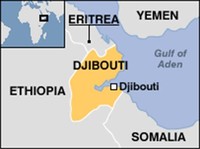
Djibouti's main advantage is its strategic location near the world's busiest shipping lanes, controlling access to the Red Sea and Indian Ocean with proximity to Arabian oilfields.

Djibouti's unfavorable balance of trade is offset partially by invisible earnings such as transit taxes and harbor dues.

Djibouti does not fully comply with the minimum standards for the elimination of trafficking; however, it is making significant efforts to do so based partly on the government's commitments to undertake future action.

The bulk of Djibouti's people are urban residents; the remainder are herders.

Djibouti's arid, rocky soil limits agriculture, and much of the nation's funds come from charging trans-shipment fees for goods exported from or destined for neighboring landlocked nations such as Ethiopia.

Djibouti is greatly affected by events in Somalia and Ethiopia, and therefore relations are important and, at times, very delicate.

Djibouti is a semi-presidential republic, with executive power in the government and legislative power in both the government and parliament.

Djibouti is made up of two main ethnic groups: the Afar and the Somalis, along with French and Arab citizens.

Djibouti itself has few exports, and the majority of its imports come from France.

After the terror attacks of September 11, 2001, Djibouti joined the global War on Terror, and now hosts a large military camp, home to soldiers from many countries, but primarily the United States.

Despite recent modest and stable growth, Djibouti is faced with compelling challenges, particularly job creation and poverty reduction.

A lot of Djibouti's original art is passed on and preserved orally, mainly through song.

Eritrea's President Isaias visited Djibouti in early 2001, and President Ismail Omar Guelleh made a reciprocal visit to Asmara in the early summer of 2001.

The divide is further complicated by the fact that though Djiboutians share a faith in Islam, the Arab population holds the dominant commercial connection to the broader Arab world.
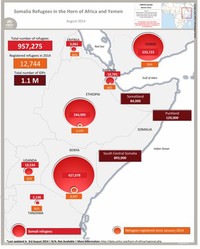
In 1996 a revitalized organization of seven East African states, the Intergovernmental Authority on Development (IGAD), established its secretariat in Djibouti.

The most famous Serbian vampire was Sava Savanovic, from a folklore-inspired novel by Milovan Gliљi?.

Among the 15,000 foreigners residing in Djibouti, the French are the most numerous and include 3,200 troops.
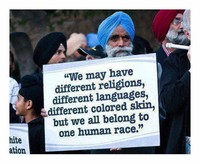
Being of another religion is greatly discouraged, especially because Djibouti's state religion is declared Islam.

The city of Djibouti, which had a harbor with good access that attracted trade caravans crossing East Africa as well as Somali settlers from the south, became the new administrative capital in 1896.

In 1991 and 2000, Djibouti played a key role in the search for peace in Somalia by hosting Somali reconciliation conferences.

On the other side of the Red Sea, on the Arabian Peninsula, 12 miles (20 km) from the coast of Djibouti, is Yemen.

Djibouti's second president, Guelleh was first elected to office in 1999, taking over from Hassan Gouled Aptidon, who had ruled the country since its independence from France in 1977.
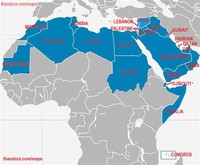
Djibouti is a member of the Arab League, as well as the African Union (AU), and the Intergovernmental Authority on Development (IGAD).

Principal exports from the region that transit Djibouti are coffee, salt, hides, dried beans, cereals, other agricultural products, and wax.

In 2000, after three years of insufficient rain, fifty thousand drought victims entered Djibouti.

Djibouti is mostly barren, with little development in agriculture and industry because of the harsh climate, unskilled labor, and limited natural resources.

Women in Djibouti enjoy a higher public status than in many other Islamic countries.

Djibouti's stable economic growth in recent years is a result of achievements in macroeconomic adjustment efforts.

Djibouti is bordered by Eritrea in the north, Ethiopia in the west and south, and Somalia in the southeast.
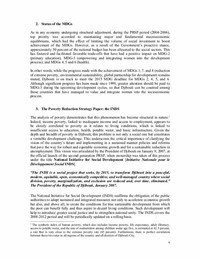
Conditions of the structural adjustment agreement signed by Djibouti and the IMF stipulate increased privatization of parastatals and government-owned monopolies.

In 2002, following a broad national debate, Djibouti enacted a new "Family Law" enhancing the protection of women and children, unifying legal treatment of all women, and replacing Sharia.

Renewed fighting between Ethiopia and Eritrea was beneficial to Djibouti, with the Port of Djibouti now serving as landlocked Ethiopia's primary link to the sea.

The electorate voted for independence in a May 1977 referendum, and the Republic of Djibouti was established in June that same year.

In 2002, U.S. units began operations from Djibouti with the aim of countering the possible threat of Islamic terrorism in the Horn of Africa.

French president Napolean Bonaparte responded by sending General Richepance to Guadeloupe to put a stop to the murder spree, and restore the institution of slavery, which would remain in place until 1848.

Djibouti's efforts to promote reconciliation in Somalia led to the establishment of the Transitional National Government (TNG) in Somalia.

Djibouti's assets include a strategic geographic location, an open trade regime, a stable currency, substantial tax breaks, and other incentives.
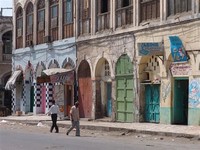
Djibouti, officially the Republic of Djibouti, is a small country on the northeast coast of the Horn of Africa.

Djibouti has forged strong ties to the United States in recent years, and foreign aid from Washington plays the lead role in Djibouti's economy.

Djibouti's military and economic agreements with France provide continued security and economic assistance.

The Somali ethnic component in Djibouti is mainly composed of the Issas, who form the majority (60 percent).

Djibouti hopes the TNG can form the basis for bringing peace and stability to Somalia.

Most imports are consumed in Djibouti, and the remainder goes to Ethiopia and northwestern Somalia.

Somalia has in the past claimed the areas of Djibouti inhabited by Somalis as part of the Greater Somalia idea.

The city of Djibouti, which had a harbor with good access that attracted trade caravans crossing East Africa as well as Somali settlers from the south, became the new administrative capital in 1896.

Djibouti has been the host country for French military units since independence.




